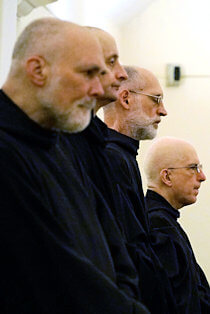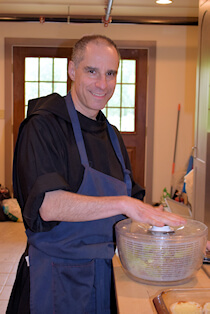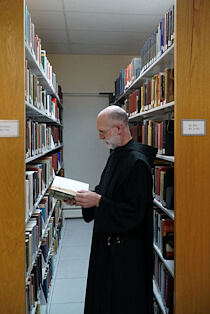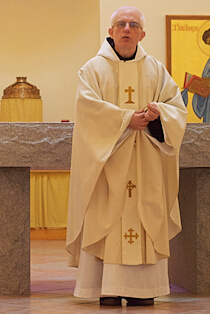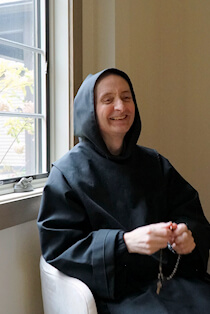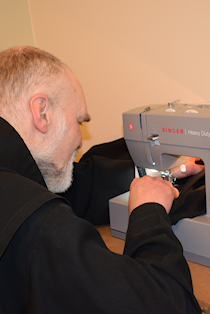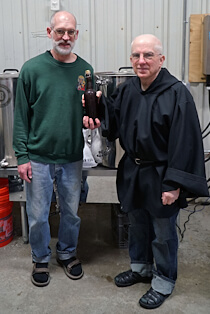Monastic Life According to the
Rule of St. Benedict
The daily life of the monks of St. Mary’s Monastery is given structure by the Rule of St. Benedict and the customary of the house. The Rule provides the general framework and spirituality for our daily schedule, and the customary provides details which may change as situations warrant. Some parts of the Rule are not followed in our modern era, but the spirit of the Rule can be followed in every age because it is based on the Gospel. The one maxim that encapsulates its spirit is this: the monk is to constantly seek God. Whatever he does, he is to seek God’s will in everything, and seek union with God himself.
Prayerfulness
The contemplative monk’s primary activity each and every day of his life is prayer. The monk should strive to be recollected in prayer throughout the day as he moves from one particular activity to another. To facilitate this, we try to maintain silence in the monastery as much as possible as well as minimize the distractions of the outside world. We do not leave the grounds without good reason, watch television, listen to the radio, or generally allow access to the internet. Except at certain times, we do not engage in conversation with guests. We do all this to better enable us to keep an attitude of continual prayerfulness.
Liturgical Prayer
If there is one main aspect of Benedictine spirituality, especially for contemplatives, different from other religious traditions, it is the prominence given to the solemn celebration of the Sacred Liturgy. The Liturgy is not simply the Mass, but the whole Divine Office: the official public prayer of the Church as it is celebrated each day by all priests and religious, consisting mostly of the Psalms. We gather seven times a day in church to sing each Office in choir. St. Benedict called this “the Work of God”, not simply because it is work done for God, but that it is work done by God with and through us. “Where two or three are gathered in my name, there am I in the midst of them.” (Matthew 18:20) St. Benedict stresses that this “Work”, which is the praise and worship of God, is to have priority in the life of a monk: “Nothing is to be put before the Work of God” (Rule ch. 43).
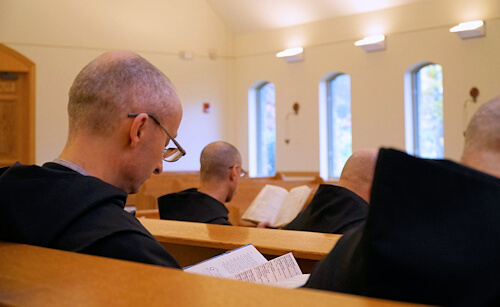
Lectio Divina
Lectio divina (translated “divine reading”, pronounced 'LEX-ee-oh') is the practice of a prayerful reading of primarily Sacred Scripture, although other spiritual books can be used. It is not just reading when one feels like it. Specific times are allotted for lectio in the daily schedule. During lectio time, the monk reads the text slowly and deliberately, listening to the Word of God with his ears and his heart as if God is speaking directly to him. As he reads in this receptive awareness, God can speak in the “still, small voice” (1 Kings 19:12) to the monk’s heart, and the monk gives himself over to reflection and prayer not caring how long it takes to get through a particular chapter or even verse. Therefore, lectio is seen as a dialogue between the monk and God. It is an important way in which monks pray, and often how God influences us and moves us in our daily lives. Using texts that we have read perhaps hundreds of times, the Spirit can breathe new meaning into them at the appropriate time.
Work
Work is a necessary compliment to contemplative prayer in Benedictine spirituality. Not as a practical necessity which interrupts prayer, but as a spiritual work which accompanies prayer, or is prayer. The monk strives to pray as he works and work as he prays, or at least to keep himself in the presence of God. This is why the ideal character of monastic work is that it can be done in silence and solitude, or if not, calmly and quietly, and as far as possible within the confines of the monastery. So planting, weeding, and harvesting in our vegetable garden, landscaping, cooking, cleaning, organizing our library, office work, working at various crafts, and teaching those in formation in the monastery, are all opportunities to seek God in humility and obedience. Ideally, some monastic work develops money-making industries from which the monastery can support itself, since St. Benedict asserts that “then are they truly monks when they live by the labor of their hands, as did our Fathers and the Apostles” (Rule ch. 48).
Private Prayer
Private prayer, which does not have any particular structure or method as liturgical prayer or lectio divina do, is also very important to the life of the monk and all Christians. Whether it’s familiar conversation with God, formulated prayers, the recitation of the Rosary, or just “listening” in the presence of Christ, the monk spends a certain amount of time each day praying silently, either during set prayer times in church or in his room.
Eucharistic Adoration
Our communities participate in prayer before the Blessed Sacrament on most First Fridays of the month, from after Vespers until Compline on Sundays, and on the Feast of Corpus Christi.
Living in Community
While the word “monk” derives from the Greek word monos, meaning single or alone, which reflects the monk’s singular dedication to God, we live in community as brothers. It is most important for monks to be willing and able to relate to each other in Christian charity, to assist each other, to bear with each other’s flaws, and to forgive each other. Each of us must labor to be “one in heart” (Acts 4:32), not seeking what’s best for oneself, but for the community. Each day we set aside half an hour for “recreation”, a time when we come together for conversation. On Sundays, Solemnities, and some holidays, we join the nuns of St. Scholastica for twin-community recreation.
Schedule (Normal Weekday)
So, on a normal weekday we rise at 4:35 am and begin Vigils at 5:00 am. Vigils (also known as the Office of Readings) lasts about an hour. It consists of 12 psalms mostly sung recto tono (on one note), with some recited, a long scripture reading, and a commentary on the reading usually from the Fathers of the Church. It is followed by a period of lectio divina until 6:30, and then the Office of Lauds, or Morning Prayer, is sung, ending at about 7:15. The monks have breakfast after Lauds. The rest of the time until Mass is spent in lectio divina. Mass is at 9:30 and concludes with the short office of Terce. This is followed by a short community meeting at which a section of the Rule is read and the Superior may give a conference or make announcements. Work follows. The community gathers again at 1:00 pm for the short office of Sext. Lunch, the main meal of the day, follows. We eat in silence while listening to reading. After lunch there is about an hour and a half of free time, when the monk can rest or pursue private interests, then another short office, None, at 3:00. This is followed by work or studies until Vespers. Vespers is at 6:00 and lasts about half an hour. After Vespers there is a period of private prayer in the church, then supper at 7:05. After supper there is a half hour of recreation. The day ends with the office of Compline, sung at 8:00 with no lighting except candles, and lasting about 15 minutes. This begins the night silence. The monks return to their rooms to retire, or read or pray. The schedule is a bit different on Sundays and Solemnities, with more lectio time in the morning and free time in the afternoon.
